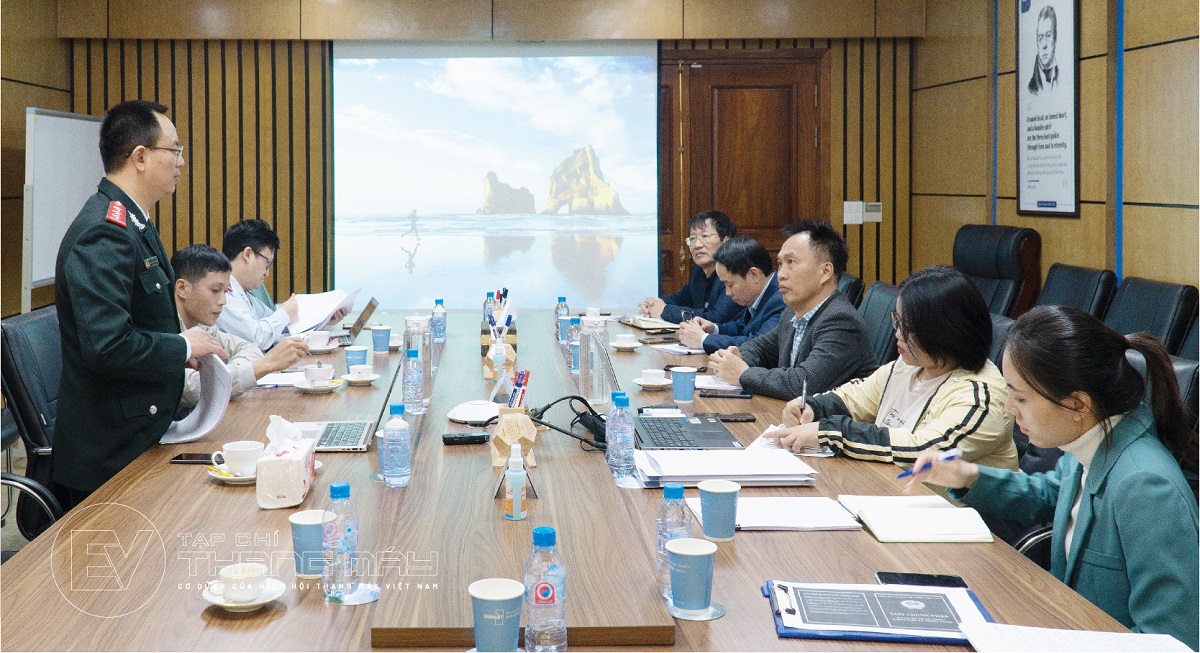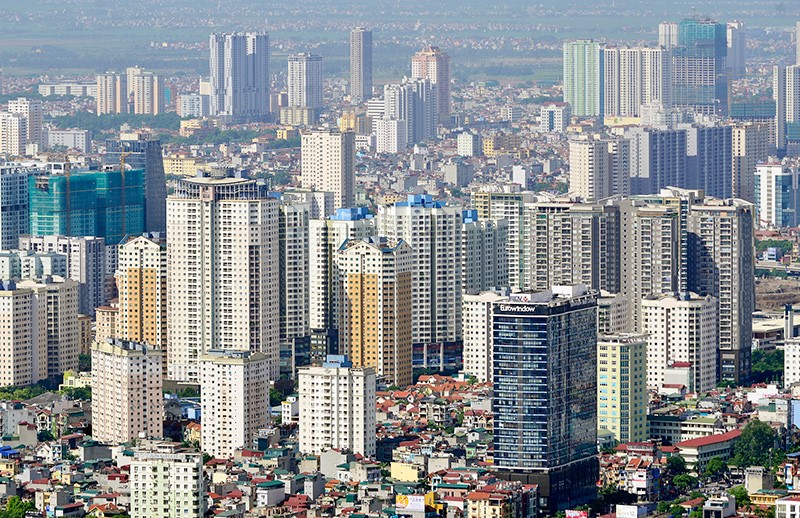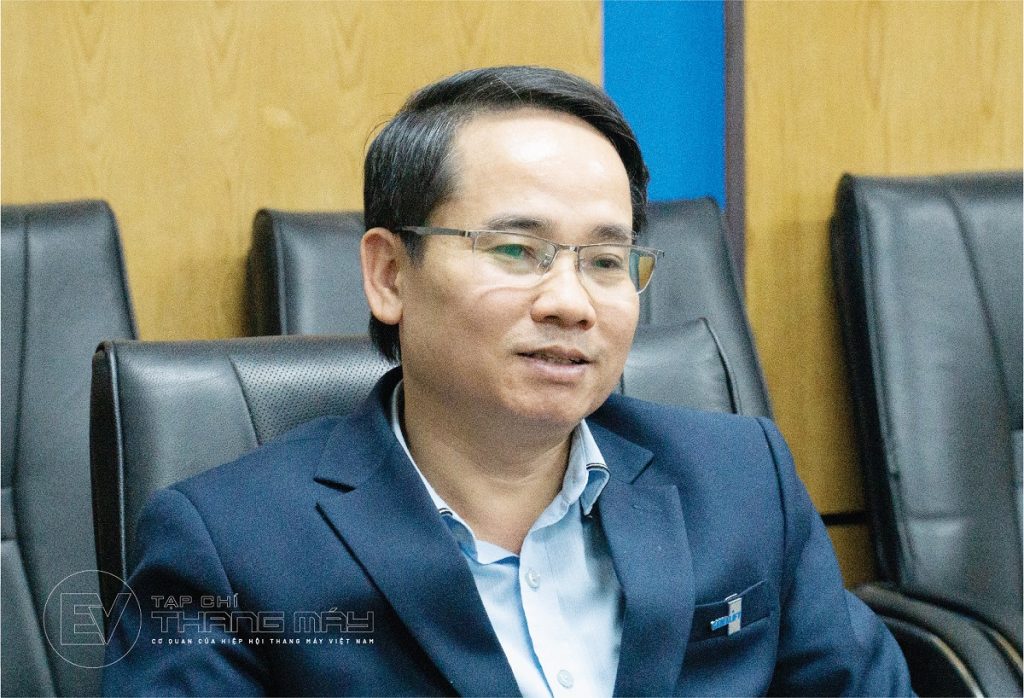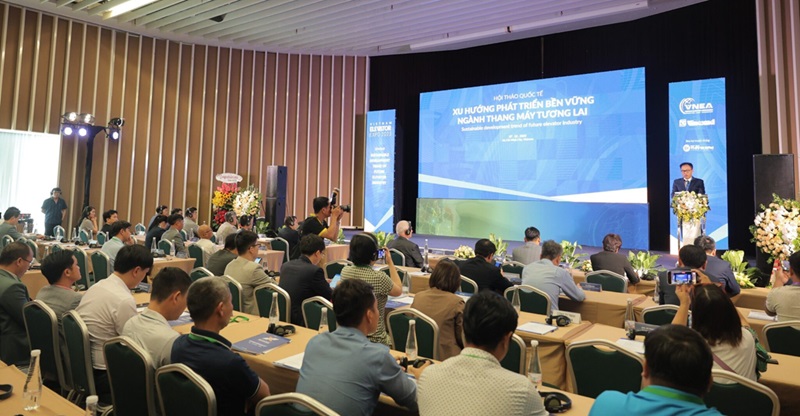Thousands of households in resettlement areas of Hoang Mai district, whether they like it or not, still must use elevators that are not qualified to operate. That means danger is hidden on every trip. Managers and firms are not irresponsible, but in the end, who should be responsible?
It’s time to “stop”!
Bringing people’s frustrations to Hanoi Housing Development and Management One Member LLC, reporter of Elevator Magazine was introduced to the Company’s Technical Planning Department. Mr. Nguyen Van Bang, an official of the Department, said that Den Lu resettlement house was originally built nearly 20 years ago, so all equipment and infrastructure have deteriorated a lot, not just the elevator. When asked about the inspection record of the elevator at Den Lu Resettlement Area of Hoang Mai District, Mr. Bang said that there were conclusions of the inspection party, according to which, there were 20 elevators that failed the inspection, 2 elevators were completely damaged and only 4 elevators were satisfied.
According to Mr. Bang, after the inspection results are completed, they must report to the Department, but now what would people use if elevator is not running? In addition to asking this exclamation question, Mr. Bang also shared that there was a time when the company stopped the elevator to ensure the safety of the people, but it was the people who pulled together to “protest” to ask for the elevator to be operated. That’s why the Building Management Board continues to let the elevator operate.
But is this the only and optimal option? People can only see the immediate benefits, but from a management perspective, this choice of the Management Board is no different regardless of the danger of the population!
According to Clause 5, Article 23 of Decree No. 28/2020/ND-CP stipulating penalties for administrative violations in the field of labor and social insurance, sending Vietnamese workers to work abroad under contracts with stipulate a fine of between VND 50,000,000 and 75,000,000 for one of the acts of continuing to use machines, equipment and supplies subject to strict requirements on occupational safety which have been inspected but the inspection results are not satisfactory. However, the Management Board still disregards the dangerous risks to health, even people’s lives to continue operating the elevator!
At the meeting with the Department of Occupational Safety, the representative of this unit also confirmed the mistake of the Building Management Board, and this unit also aimed to investigate the responsibility in accordance with regulations.

The Vietnam Elevator Association worked with the Inspector of the Department of Occupational Safety, Ministry of Labor – Invalids and Social Affairs on the elevator safety incident at Den Lu Resettlement Area (Hoang Mai, Hanoi).
The process is still correct …?
In order to repair and maintain, it must follow the process of capital construction investment, the type must have a list, the type must have a plan. After the plan and list is completed, the cost estimate must be submitted, then bid again, if not, the contractor must also be appointed, these items are not decided by the direct management unit but must be decided by the Department of Construction, then the City will approve the grant or not. That is, if you want to fix a broken elevator, you must go through many stages of the process and through many levels of approval.
When the representative of the house management company presented the process of this unit submitting reports, suggestions, maintenance plans, etc., we are very sympathetic that the process is still complicated. For example, in order to consult with the Hanoi Department of Construction, Elevator Magazine contacted us, but this unit requested to send a written request to work in accordance with the process, on 24/11 we sent a dispatch but so far the Department has not responded. According to Decision 452/QD-BTC on the promulgation of regulations on receiving, processing, and responding to complaints and petitions from people and businesses on administrative regulations under the management of the Ministry of Finance on Government information system: The maximum time limit for processing and responding to complaints and petitions is 15 days from the date of receipt of complaints or petitions. After 07 days, the units assigned to take charge of updating how situation is handled into the Government Information System to inform people and businesses. So, is the process right?
Assuming that only in the case with Elevator Magazine does this situation happen, then the first elevator at G house in Den Lu Resettlement Area has broken down since 2019, the second one in 2020, is it possible? Is the process having a problem with the process? Even if it is an essential device in the daily use, even if the elevators in Den Lu Resettlement Area are mostly unsafe and the safety of people is not guaranteed!
For the resettlement areas, people can’t do anything but wait, but the apartments built for resale are also fraught with danger with the elevator. According to the 2014 Housing Law, the elevator is a common ownership part of the apartment building, using funds for the maintenance of the shared area. According to Article 36 of Decree 99/2015/ND-CP detailing and guiding the implementation of a number of articles of the Law on Housing, it is required: “The buyer, the tenant, and the investor must pay 2% of the budget. maintain the shared ownership of the apartment building as prescribed in Article 108 of the Law on Housing; This amount is calculated before tax.” According to these regulations, basically the maintenance and replacement of equipment at the apartment building is proactive according to practical needs. However, there are still outstanding problems that make apartment elevator safety still not guaranteed.

The dizzying growth rate of high-rise buildings and apartments in Hanoi in particular and the whole country in general creates pressure to ensure safe elevator operation.
There has been a case that after selling all the apartments in an apartment building, the maintenance cost of 2% has not yet been handed over, the investor has dissolved, “evaporated” from management. Each apartment has been issued with a Land Use Rights Certificate, private property is separate, common property is ” Everybody’s bussiness is nobody’s bussiness “. Until maintenance errors occur, no unit is responsible.
Clause 1, Article 105 of the Law on Housing 2014 stipulates the management and operation of apartment buildings, stating: For apartment buildings with elevators, the apartment building meeting shall decide to self-manage the operation or hire a functional unit. management and operation capacity of the apartment building. In case of hiring a unit with functional management and operation capacity, the apartment building management and operation unit also needs to meet the functional and capacity conditions as prescribed in Clause 2, but in the provisions of this Decree. However, there are no specific requirements for elevators, although according to Circular 36/2019/TT-BLDTBXH promulgating a list of machines, equipment, supplies and substances with strict requirements for safety and hygiene. Laborers, elevators are classified into the group of machines, equipment and materials with strict requirements on occupational safety.
Thus, it is this “self-determination” that causes the human resources to operate the apartment elevators without a guaranteed competency framework, usually only through an initial training course on operation, but the skills and resources related to rescue, knowledge of maintenance, inspection, etc., but there are not any specific regulations related to elevators. So are there still inadequacies that need to be added in the stricter legal corridor for apartment elevators in terms of the investor, the capacity of the elevator operator and issues related to the regulations?
Not irresponsible, but who is responsible?
It’s time for all units to look directly at the problem, look directly at the reality that people’s suffering every day and the dangers that are lurking can happen at any time!
The elevator inspection period at Den Lu Resettlement Area took place on March 31, 2021, so far it has been more than 8 months, but 20 unqualified elevators are still operating. The incident may not have happened in the past 8 months, it may not have happened today, how about tomorrow, next month, next 8 months? And if it happens, everyone will think that they are not irresponsible, the consequences are probably only the people – who are scared every day on every trip without any other choice.
According to Section 3, Article 6 of the Regulation attached to Decision 18/QD-UBND dated August 23, 2018 of the Hanoi People’s Committee on the order and procedures for maintenance for unexpected damaged equipment, the Department of Construction can approve the capital advance and handle it promptly to ensure the needs of the people, especially with the elevator in case of unexpected failure. However, this regulation has not really shown its effectiveness in practice.
“Although there are regulations on six urgent items, in reality, there is no official document that allows shortening the procedure. But according to the regulations on procedures, there are processes that must be from the list, from the plan, from the estimate, and then the contractor selection plan. In the bidding law or other regulations, there is no specific shortening of procedures. Even if you fix it right away, you still have to follow the procedures prescribed by the law.” – Company representative shared.
So, should City of Hanoi have a different process more suitable for these urgent situations? Or are such up-to-date decisions as above just “updating” in theory, whether the proposed process is with the Department of Construction and then the City People’s Committee, then the Department of Finance, or any other relevant authorities should reform in terms of procedures towards thoroughly solving people’s problems?
When will people stop worrying on their way back?
Meeting and working with people, the reporter of Elevator Magazine also cannot avoid worrying with people on up and down trips. And there will not only be more than 500 residents at house G of Den Lu Resettlement Area every day fearing on the way back, not only will 20 unapproved elevators here still operate every day, but there will also be How many other worrying trip in other places?
Recognizing the danger of the problem, Elevator Magazine and the Vietnam Elevator Association have proposed to work with the authorities to thoroughly solve the problem.
With the spirit of goodwill and cooperation, the Vietnam Elevator Association has worked with the Department of Occupational Safety, the Ministry of Labor – Invalids and Social Affairs to provide practical information and documents, thereby The Department of Occupational Safety and Health will advise leaders at all levels of necessary inspection and inspection activities, along with working with units related to the incident at Den Lu Resettlement Area to thoroughly solve the problem for the citizen.

Mr. Nguyen Huy Tien, General Secretary of the Vietnam Elevator Association shared at the meeting with the Inspector of the Department of Occupational Safety.
In addition, towards the goal of solving the long-term problem of apartment elevator safety, the Elevator Association also wishes to organize a seminar to propose policies; orient, advise and develop long-term solutions to ensure elevator safety in apartment buildings. Mr. Nguyen Huy Tien, General Secretary of Vietnam Elevator Association shared: “Although knowing that the problem of apartment elevator safety is not new, there have been many press reports but no radical solution. With a passion for the elevator industry, we hope that everyone can use the elevator for convenience and safety, because we believe that sowing good hearts will reap good results, not only for the elevator industry but also for society as a whole.” Accordingly, the Vietnam Elevator Association has established Institute of Applied Research in Elevator Engineering, aiming to build a research, training and coaching model on professional competence in the elevator field for relevant subjects such as: human resources for elevator maintenance, operation, management, etc…



